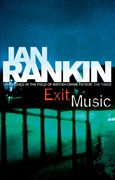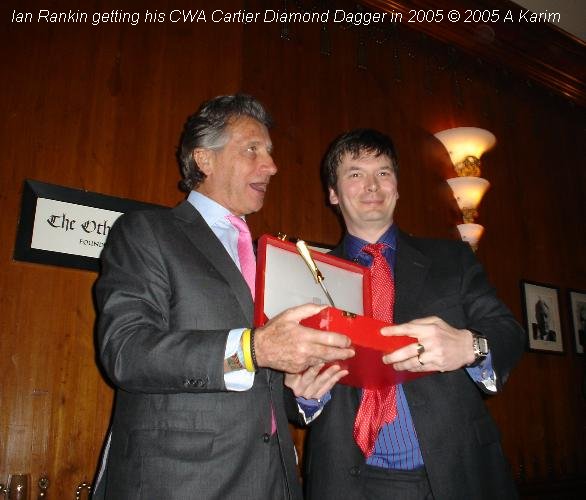|
THE week before I get to work on
this article, I bump into Ian Rankin in the foyer of the BBC's Edinburgh HQ.
I'm here to discuss the
'post-Rankin generation' on Radio 4's Open Book, such is the interest in the
UK's most popular crime writer.
As I spot Rankin, there's a twinge
- his latest, and possibly final Rebus book is due out soon and he's currently
besieged by the media - how will he react to more glad-handing?
Jump five minutes and my fears are
allayed: the man is ice. Strolls over, sharply suited, an air of calm about him
as he begins to chat about his new book, Exit Music.
Jump another week, and he's agreed
to this interview. I try to get to the bottom of two recently printed comments
about the blanket coverage he enjoys: is Rankin 'manipulating the press'? Or
merely 'playing the minx'?
“I haven't heard
either of those quotes. I'm not aware that I've ever tried manipulating the
media; and as for being a 'minx' ... I don't see it.”
He expounds:
“Quite
a lot of the publicity I get is positive. In the UK we are known for our
tall-poppy syndrome, in which we build people up then come to loathe them.
Hasn't happened to me yet, for which I'm grateful.
“I still have a good
degree of anonymity, and can go most places without being recognised. Anyone
who's been on daytime TV will have more chance of being spotted in the street
than a Rankin or a Rowling.
“When I started, and
for the first half dozen Rebus books, I got scant-to-no media attention. I could
walk into Edinburgh bookshops and find the shelves bereft of Rankin titles; it
was all more than a little depressing. So I'm not about to knock any interest in
me, especially if it brings readers to the books - and maybe to crime fiction in
general.”
Well, that's that
cleared up then. We move on to the more serious issue of, his writing. I put it
to Rankin that Rebus, in terms of popularity, is rapidly becoming something of a
later-day Sherlock, an assumption he modestly deflects.
“I'm not sure Rebus
is up there with Sherlock Holmes in terms of global recognition - you'd have to
go to Harry Potter instead,” he says.
“The books sell well
in some countries, less well in others. Nor has the TV had the success (so far)
of Morse. I'm happy with the way the books have been received and happy that I
have created a version of contemporary Scotland which readers seem to enjoy.”
It has, however,
been a slow burn. Rebus didn't reach his highs of popularity overnight.
“The early Rebus
books were neither as big nor as complex as the later ones,” Rankin explains.
“They served as an
apprenticeship, during which I grew in confidence. I realised that crime fiction
can take on big ideas and themes and explore important contemporary issues and
dilemmas. As the books got better, so sales started to increase. A lot of it was
down to word of mouth and enthusiastic booksellers.”
With Da Vinci Code-esque
economies of scale all pervasive these days, I ask him, are the chances of
publishers taking the risks they took with his own early career over?
“Good question. We
used to say that in the UK if a publisher believed in the quality of your
writing, they would happily publish you at a loss year after year. I can't see
that situation continuing, which means we're now more like the American model,
where publishers expect you to make it big from the very beginning. Problem with
this is, it can be ruinous (in the medium-to-long term) for younger writers.
Hype (and elongated touring) can play havoc with the creative impulse,” he says.
It's true that the
publishing world seems to be spinning itself into an enthusiastic whirl every
few months to produce the 'New Rankin'. It's not a tag that seems to bother, the
real McCoy, though.
“It was bound to
happen,” he says.
“Publishers don't
like to take risks, so they will happily piggyback on your success rather than
put some effort into establishing a new writer as a wholly individual and
challenging voice. Hey, it happens to me in some countries where I'm called 'the
new Henning Mankell'...”
One thing's for
sure, Tartan Noir is enjoying a surge in popularity and its 'King' as James
Ellroy christened him, thinks it's about time.
“There's never been
a better time to be a young, urban British (especially Scottish) crime writer
than now,” insists Rankin.
“Crime is sexy and
publishers are looking for the next big thing. I only wish this were true of
other genres.
“Crime fiction is
taken more seriously than ever and has attracted a new generation who don't
think of it as a second-rate genre. This means quality writers who are pushing
in new and exciting directions, be they Denise Mina or David Peace.”
The reasons behind
the current boom in Scottish crime writing remain elusive, but Rankin offers
some explanation.
“I'm not sure why
there has been an explosion of talent north of the border in the crime genre.
Maybe you reach a critical mass, and once one or two writers have made a success
for themselves, it gets easier for other writers to get noticed (and get deals).
Maybe it's because there is no real tradition of the crime novel in Scotland (we
have gothic adventure stories instead). There's no Agatha C for us to be in
thrall to, so anything goes.”
He insists we
haven't peaked in Scotland yet, and says the current practitioners of Tartan
Noir are 'firing on all cylinders'. His own efforts as an outspoken champion of
the genre - he asserts it should be accorded the same gravitas as literary
fiction - may have something to do with this.
“You can now study
crime fiction at some universities. You can write high school English essays
about crime novels,” he says.
“We need more
in-depth reviewing of crime fiction in the news media, and soon enough the
literary prizes will find crime writers on their shortlists.”
It's a prediction we
should all take note of. One more I ask him for relates to his serial detective,
and when the right time for Rebus to bow out might be.
“I think the time to
give up is when the author loses interest in the character or series; when you
find you have nothing new or interesting to say.”
But for Ian Rankin
that may well be a long time off, with a host of new projects lined up.
“I've got a wheen of
work on the horizon: a comic book for Vertigo Comics in New York; beefing up my
recent New York Times serial into a fully-fledged novel; an opera libretto; and
two further books which I'm contracted to write but don't have any ideas for as
yet.”
And what about those
rumoured big-name collaborations?
“Peter Robinson and
me (and Michael Connelly and others) sometimes have a sherry too many and
promise each other we'll do a joint book someday in the future. I doubt it'll
ever come to pass.”
And with yet another
media confusion cleared up, I hear the Exit Music calling.

|
Exit Music is
published by Orion on September 6th hbk £18.99
|
Tony Black's first novel PAYING FOR IT is to be published by Random House in
2008. Ken Bruen kindly praised the book, saying it "blasts off the page like a
triple malt . . . one adrenaline-pumped novel that is as moving and
compassionate as it is so stylishly written". More of his writing can be found
online at: Scotsman.com, Books from Scotland, Thug Lit, Pulp Pusher and is
forthcoming in Demolition and Out of the Gutter. Black lives and works in
Edinburgh. Reach him at: t_black_uk@yahoo.co.uk
|






